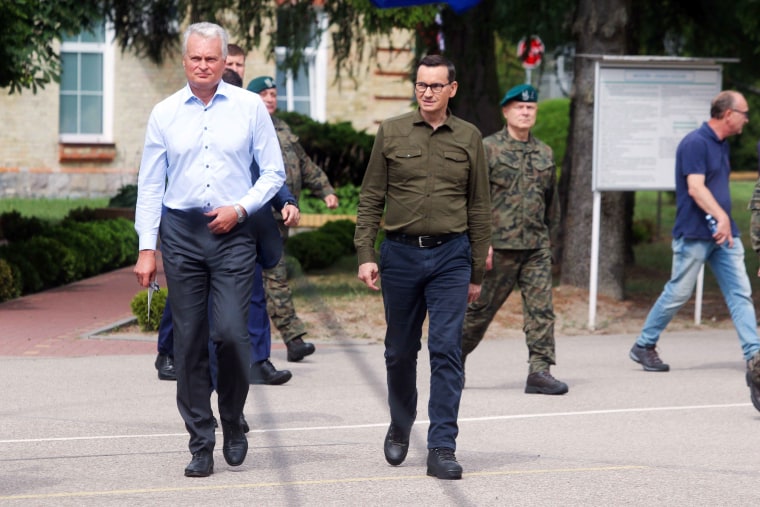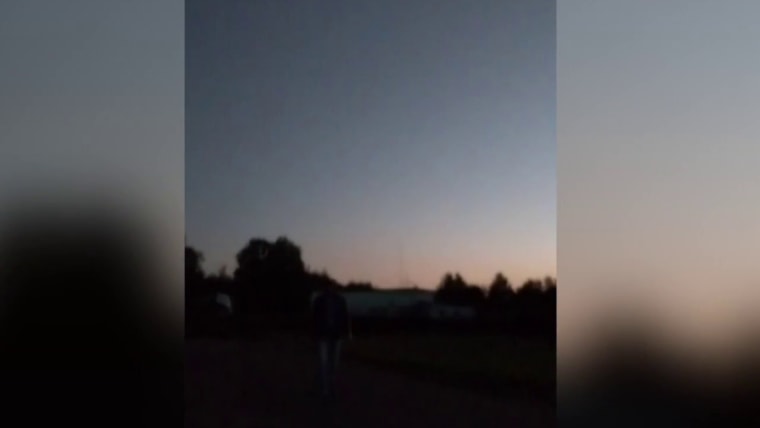Poland said this week it would move 10,000 troops to its border with Belarus, the latest sign of unease among America’s friends at the presence of Russian mercenary forces now based in this close Kremlin ally.
The mutiny by Wagner Group chief Yevgeny Prigozhin and his battle-hardened fighters posed a rare challenge to President Vladimir Putin’s authority. But the deal to end their short-lived rebellion has now also added a destabilizing element to tensions between Moscow and the West — compounded by Russia’s own plans to beef up its flank.
The mercenaries, who fought in some of the war’s most grueling battles, are now helping to train Belarusian armed forces, having been exiled to the country. And although President Alexander Lukashenko said their presence was temporary, there are lingering questions around the size of their contingent and their proximity to the borders with Poland and Lithuania, two NATO members on the alliance’s eastern border.
Warsaw and its neighbor have been staunch supporters of Kyiv’s defensive fight and long voiced concerns about the war spilling over to threaten their own security, but a flurry of moves in the past week suggest those fears have taken on new intensity.
Poland’s ambassador to the United States, Marek Magierowski, told NBC News it was “imperative” for his country to not only defend itself, but also protect NATO’s eastern flank. The region should be braced for “further provocations” from Moscow and Minsk in the months to come, he added.
“Poland is the only E.U. country which borders Russia, Belarus and Ukraine,” he said. “It’s almost 800 miles combined. You can only imagine how volatile the entire region is nowadays.”
Neighborly ‘provocations’
PolIsh Prime Minister Mateusz Morawiecki warned last month that about a hundred Wagner fighters moved toward a stretch of land known as the Suwalki gap, which lies along Poland’s border with Lithuania, separating Belarus from the Russian enclave of Kaliningrad.
The geography of the region means that taking control of the area would mean that the Baltic states of Lithuania, Latvia and Estonia would be cut off from the rest of NATO — making any potential threat particularly sensitive.
Last week, Warsaw also accused Belarus of violating its airspace with military helicopters. Minsk called the accusation “far-fetched” and a way for Poland to justify a buildup on the Belarusian border.
Earlier this month, though, the Belarusian president stirred the pot: Poland should be thankful that he is holding Wagner fighters back because, he suggested, they had been talking about going on an “excursion” into a Polish border town.
Lithuania is also worried.
Lithuanian President Gitanas Nausėda met with Morawiecki in the Suwalki region last week.
“Presence of Wagner mercenaries in Belarus is an additional security risk factor for Lithuania, Poland and NATO allies,” Nausėda wrote on Twitter after the meeting. “We stay vigilant and prepared for any possible scenario.”

Belarus announced military exercises near its borders with Poland and Lithuania this week, saying it will be drawing on the experience of the “special military operation,” the name Russia uses for its full-scale invasion of Ukraine.
Belarus is now also believed to harbor Russian tactical nuclear weapons that Putin promised to transfer to his ally last month.
And adding to the growing concern, Russian Defense Minister Sergei Shoigu said Wednesday that the Kremlin was going to bolster its forces on its western borders as the war drags on, driven in part by the accusation that Poland planned to occupy western Ukraine — a charge dismissed by Kyiv and Warsaw.
Magierowski, the ambassador, labeled Shoigu’s comments “as outlandish as it gets,” and accused Russian officials of trying to drive a wedge between Ukraine and Poland.







